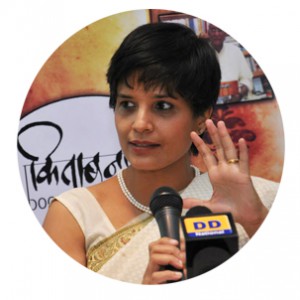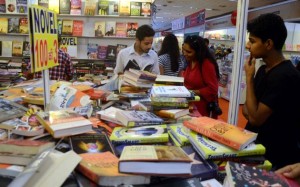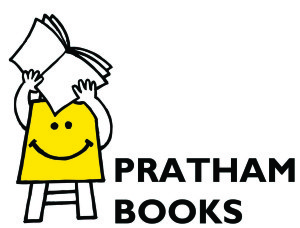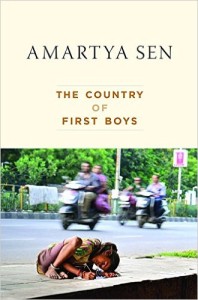Literati: “For the price of a book…” ( 13 September 2015)
 My monthly column, Literati, in the Hindu Literary Review was published online ( 12 September 2015) and will be in print ( 13 September 2015). Here is the http://www.thehindu.com/books/literary-review/jaya-bhattacharji-rose-on-the-hunger-for-books-in-india/article7641333.ece. I am also c&p the text below.
My monthly column, Literati, in the Hindu Literary Review was published online ( 12 September 2015) and will be in print ( 13 September 2015). Here is the http://www.thehindu.com/books/literary-review/jaya-bhattacharji-rose-on-the-hunger-for-books-in-india/article7641333.ece. I am also c&p the text below.
How can you argue with the low prices, especially in a nation where such a hunger for books exists?
This year the Delhi Book Fair held at Pragati Maidan was held on a much smaller scale than previous years. It was dominated by stalls put up by publishers of school textbooks. Government institutions were represented by the National Book Trust, Sahitya Akademi and Indira Gandhi National Centre for the Arts with their reasonably priced publications in many Indian languages and dialects. Religious organisations too displayed their publications, some of which were being distributed free. Most of the larger publishing houses were conspicuous by their absence (preparing for the next edition of the World Book Fair 2016).
But it was the smaller stalls of remaindered books that were fascinating. These are books that are scheduled for

Visitors having a close look at the books available at the 21st Delhi Book Fair at Pragati Maidan, in New Delhi in August, 2015. Photo: Sushil Kumar Verma ( The Hindu)
pulping in other book markets and are also disposed off by weight. These titles are brought into local markets, usually priced very low. Three books for Rs.100 or for Rs. 500, depending upon their condition and interest in the book or author. It is not unusual to find books with labels from overseas school libraries and institutions, personal inscriptions or treasures like the one Jairaj Singh, a journalist, found at the Delhi Book Fair — an autographed first edition of Kingsley Amis’ Memoirs for Rs. 50 only.
People noodle through these stalls, trailing bags on wheels. Within a limited budget it is possible to acquire a pile of books till the next book fair comes around. It is to these remaindered stalls that the maximum number of buyers— teachers, parents, school children, students, librarians — go. In fact, the presence of these stalls, piled high with books, thrown in an untidy heap, was frowned upon by established publishers at the World Book Fair, February 2015. But how can you argue with the low prices, especially in a nation where such a hunger for books exists? This is borne out by the Amazon India spokesperson who says, “the number of books sold per day has grown by 1400 per cent over the past two years. Over 2500 sellers today offer lakhs of books to their customers across India on amazon.in. The portal has the largest online selection of books in India across languages, including three major regional languages — Hindi, Tamil and Kannada — which have found a huge audience, especially in non-metro cities where regional language books have featured in the top 10 bestsellers list. Over 50 per cent of the orders are coming from outside of the top eight cities.” According to informed sources, online book portals in India are growing at the rate of 12 to 15 per cent per annum.
In August 2015, the longlist for the Man Booker Prize for Fiction was revealed. It is a fabulously diverse list, exciting for the range of debut and experienced writers, geographical regions, varied writing styles and publishers it showcases. A handful, such as Anuradha Roy’s Sleeping on Jupiter, Sunjeev Sahota’s The Year of the Runaways, Bill Clegg’s Did You Ever Have a Family, Hanya Yanagihara’s A Little Life, Anne Tyler’s A Spool of Blue Thread, Marilynne Robinson’s Lila and Anne Enright’s The Green Road are readily available. But try getting hold of Leila Lalami’s The Moor’s Sigh, Chigozi Obioma’s The Fishermen or Anna Smaill’s The Chimes — you either have to pay for it online (there seems to be no fixed price for the edition even on the same portal, so a comparison of prices is advisable) or bide your time till it is available at a brick-and-mortar bookshop. Recently, there have been discussions on ebook sales plateauing, primarily because of price fluctuation and smartphones replacing ereaders. (“The plot may be unravelling for e-books” Aimee Picchi, CBS News, 4 September 2015, http://cbsn.ws/1XJDgCf )
 This is a trend apparent in India too, as is evident with the launch of the non-profit trust Pratham Books’ open source digital platform, Storyweaver (https://storyweaver.org.in/ ). It features 800 stories in 26 languages (14 Indian and 12 international languages), with an image repository of over 2,000 images. It can be viewed on desktop computers, laptops, tablets or mobile phones. Users will be able to read, download, translate, create, print and publish new stories through the platform using the Creative Commons licensed content on the site. Similarly, Daily Hunt (http://dailyhunt.in/ ) offers news, free and some nominally priced books, in 12 languages and has had 2.3 billion views a month.
This is a trend apparent in India too, as is evident with the launch of the non-profit trust Pratham Books’ open source digital platform, Storyweaver (https://storyweaver.org.in/ ). It features 800 stories in 26 languages (14 Indian and 12 international languages), with an image repository of over 2,000 images. It can be viewed on desktop computers, laptops, tablets or mobile phones. Users will be able to read, download, translate, create, print and publish new stories through the platform using the Creative Commons licensed content on the site. Similarly, Daily Hunt (http://dailyhunt.in/ ) offers news, free and some nominally priced books, in 12 languages and has had 2.3 billion views a month.
Freshly published print books continue to be unaffordable for many readers in India, as is evident from the rush to  buy cheaply priced, sometimes weathered, remaindered books. Yet, it is significant to note that most Indians, despite being economically challenged, possess a handheld device. Hence, innovative ways of bringing together literature and technology to whet a ferocious book appetite at affordable prices have to be explored. It is also a tremendous way of giving neo-literates a chance to practice their literacy too, instead of it stagnating. As Amartya Sen says in his introduction to The Country of First Boys “…having an educated …population can be a major contributor to enhancing steady and sustainable economic growth.”
buy cheaply priced, sometimes weathered, remaindered books. Yet, it is significant to note that most Indians, despite being economically challenged, possess a handheld device. Hence, innovative ways of bringing together literature and technology to whet a ferocious book appetite at affordable prices have to be explored. It is also a tremendous way of giving neo-literates a chance to practice their literacy too, instead of it stagnating. As Amartya Sen says in his introduction to The Country of First Boys “…having an educated …population can be a major contributor to enhancing steady and sustainable economic growth.”
12 September 2015

